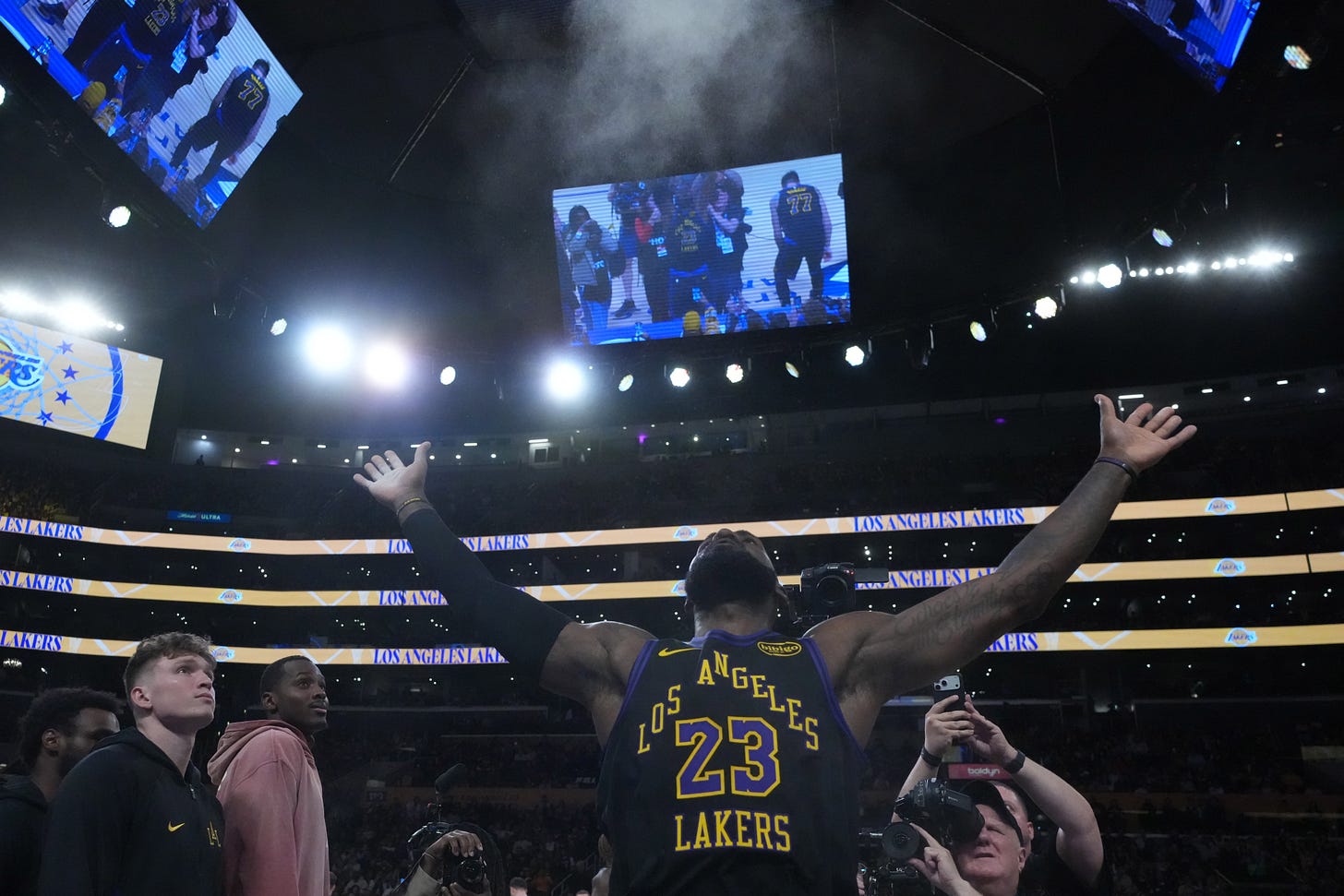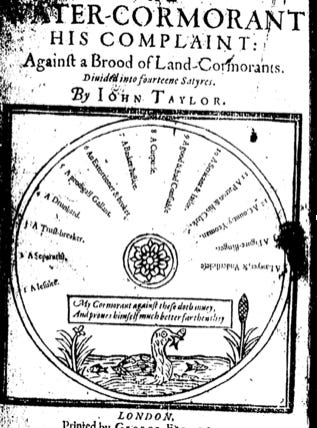The Bard knows ball
Matching recent NBA dramas with their Shakespearean equivalents.
Last week, LeBron James returned to the Lakers lineup for the first time this season. Doing so, he replaced his son Bronny James in the lineup. It was an inevitability in the sense that LeBron James is LeBron James, and Bronny is a second year player still finding his feet in the league, but it struck me as entirely Shakespearean. I couldn’t say how it specifically struck, for that I’d need someone who studied Shakespeare.
Enter Dr. Matthew Harrison, the resident Shakespearean at West Texas A&M.
Harrison spends his days teaching the Bard and has written extensively on him. When I sent him an NBA scenario to draw a Shakespearean parallel to he responded in minutes, nailing it. I suspect it was an intellectual exercise equivalent to tying his shoes.
Without further ado —
Act 1, Scene 1
LeBron James returns to the Lakers lineup in Salt Lake City, Utah, on November 18th to make his season debut. He has been dealing with sciatica; his age (41) perhaps, coming to bear. In the event of his return he replaces his eldest son and teammate, Bronny James (21), in the team’s lineup. Competitive filicide, or time’s rare reversal?
Dr. Matthew Harrison: I suspect with the LeBron situation you describe, most Lakers fans are thinking of the third part of Shakespeare’s Henry VI, where the titular king disinherits his own son in a desperate attempt to retain his crown.
This, of course, would make the newly invigorated Luka an obvious parallel with the powerful Earl of Warwick, whose arms will be crucial in the struggle for the throne.
Also, there’s a moment in Titus Andronicus, where the villainous Aaron the Moor is confronted by the sons of the woman with whom he is having an affair. One of them laments, “Thou hast undone our mother!” Aaron replies, “Villain, I have done thy mother.”
Act 2, Scene… god, it’s hard to place
New Orleans, city of revelry and history, infinitely haunted. The Pelicans are a franchise wrought with trouble and grief; their players disenchanted, their fans morose, and run by the widow of a wealthy venture capitalist with duelling professional interests who has appointed a listless executive past his prime to manage the team. They’ve recently fired their head coach after a period of gaslighting, former (and current) players have called the team cursed.
MH Ph.D.: Shakespeare has relatively few pelicans — three, by my count — but he writes frequently of cormorants, which he thinks of as voracious gluttons (perhaps like Zion Williamson?)
In the early modern imagination, cormorants not only consume whatever they can, they then vomit it back up, and so they emerge in the period as symbols of waste and greediness.
In a beautiful passage in Love’s Labours Lost, a group of very wealthy nobles set out to defy “… cormorant devouring Time,” which swallows up everything and vomits it out, hoping that “the endeavor of this present breath may… make us heirs of all eternity.”
It doesn’t. They end up embarrassed, after a very poor performance, with one of them (Biron) stuck spending the next year in a hospital.
Act 3, Scene 3
Portland, Oregon, the Pacific Northwest’s glossy green fecundity. Damian Lillard, after a morose two seasons in Milwaukee and being waived by the Bucks after tearing his Achilles, returns to where he’s beloved. The Trail Blazers are fine. Fun but not extremely competitive.
Lillard is out for the season, his former teammate and star Giannis Antetokounmpo is also currently out with injury but should be back in a couple weeks. The departure seems simultaneously abrupt and prolonged, a fracture neither wants to address.
MH Ph.D.: 33 BC. The second Roman triumvirate ends, and the fragile alliance between Mark Antony and the man who would become Caesar Augustus cracks forever (Octavian should be Giannis, because both won victories in Greece as young men, over Brutus and Cassius and the opponents of Filathlitikos B.C., respectively.)
Antony (Dame Lillard) blazes a trail back to Egypt, where he is worshipped as a god, and to his beloved Cleopatra. But as Caesar notes in the play, he’s no longer the warrior he once was.
By contrast, Augustus’s title window is just opening.
Act 4, Scene 4
Star of the L.A. Clippers, Kawhi Leonard, was found to have a lucrative deal with a carbon offset startup, Aspiration. The enrichment would be fine, if not for the deal’s tentacle ties also ensnaring Clippers owner, tech billionaire Steve Ballmer; the exact sum paid to Leonard by the company traced back to what Ballmer allegedly paid them himself.
Accusations of salary cap circumvention, betrayal, and greed run amok.
MH Ph.D.: This sounds less like a Shakespeare play than one by his contemporary Ben Jonson: The Alchemist.
While the gentleman Lovewit is out of town, a trio of urban tricksters take advantage of his absence. Their comical schemes both draw on and reveal the vanity and gullibility of victims like the gluttonous Epicure Mammon, the dopey tobacconist Drugger, and the devoutly religious Tribulation Wholesome.
Jonson would very much appreciate how the very name of the company — Aspiration— identifies the hope at the heart of gullibility. Fraud works because it plays on our aspirations, promising a shortcut to the future we’ve convinced ourselves we deserve.
Lovewit — the Ballmer of this analogy — returns home just in time to reap the rewards of the scams, without ever quite being implicated.
Act 4, Scene 5
The NBA finds itself embroiled in an FBI investigation into illegal gambling centred on intentionally thrown games by NBA personnel. The scandal involves Trail Blazers coach Chauncey Billups, current player Terry Rozier, retired player Damon Jones, apparently mafia affiliations, and a bunch of other figures with cartoonishly cinematic nicknames like Flappy, Albanian Bruce, Spook, and Juice.
Worry rises that NBA games are not immune to manipulation, trust erodes. With the league’s entrenchment in the forces of sports betting the overarching belief is that Pandora’s out of the box and there’s nothing the NBA or commissioner Adam Silver can do.
MH Ph.D.: Hamlet famously ends with an unfair wager, albeit one featuring poisoned swords rather than a rigged shuffling game. Shakespeare has his own set of bold names, too, with Rosencrantz and Guildenstern his equivalent of Flappy Poker and Albanian Bruce. It does seem as if there is something rotten in the state of Denmark.
That said, the better analogue might be Cymbeline, which also relies on a rigged bet. When Posthumous Leonatus (another good name!) brags about the virtue of his wife Innogen, the “vile” Italian Iachimo bets his estate that he can sleep with her. Though repulsed, he convinces Posthumous, and the resulting crisis of trust is devastating.
The good news for NBA fans is that there’s a happy ending. Trust is indeed restored, requiring only the intervention of two armies, a god descending on a chariot of eagles, and some two dozen lucky coincidences.
Act 5, Scene 1
After trading away the franchise’s sole star last season, the prodigy Luka Doncic, there are calls for Mavericks’ GM Nico Harrison’s head. Fans bring a coffin to games and stage a funeral for the team; “Fire Nico” chants sustain all through the sweltering Texas summer.
Since then, the Mavs have spiralled. Anthony Davis is injured and out, the front office — run by a man with questionable basketball knowledge and appointed to the role by his wealthy mother — finally caved and fired him. There have been conspiracy theories launched that this was done by the league, or the Lakers, or both.
MH Ph.D.: Shakespeare features no betrayals of this magnitude.




Punchline perfect
"resident Shakespearean" is delightful